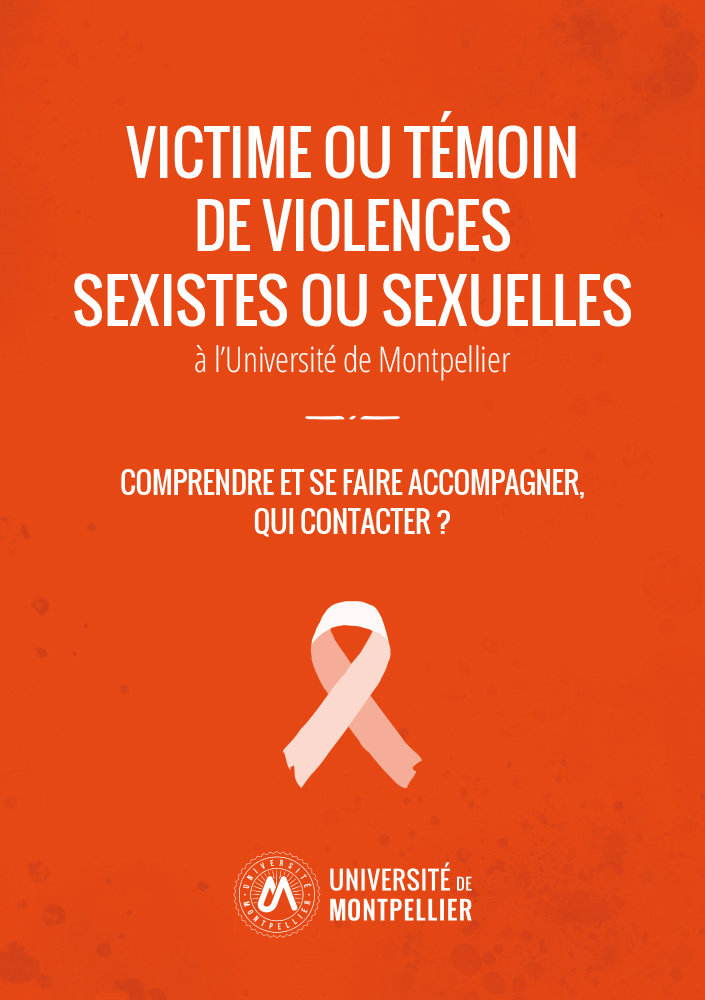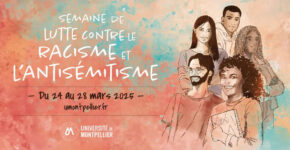Report acts of violence, discrimination, harassment and sexual harassment
As part of the gender equality plan, and to combat all forms of discrimination and violence, the UM has set up an in-house system based on referral persons and a support unit made up of a network of counsellors. This system is aimed at the entire university community, whether victims or witnesses of acts of violence, discrimination, moral or sexual harassment or sexist behaviour.
To support you: the referents and members of the listening unit
Whether you are a UM student or staff member, the UM's hotline is there to help you, to receive your report and to support you in complete confidentiality. The listening unit is made up of the gender equality officer, the vice-president in charge of social responsibility, the head of the quality of life at work department, a representative from the preventive medicine department, the social worker from the student life department (for students), the human resources department and the UM social service assistants (for staff).
These people can welcome, advise, inform and guide you, without judgment and in complete confidentiality.
Contacts for the listening team's referents
Contact us whether you're a student or a UM staff member.
To report sexist or sexual violence:
To report all other acts of violence, discrimination or harassment:
Contacts for other members of the listening team
For students:
- Joint preventive medicine and health promotion service
Tel: 04 34 43 30 87
E-mail - Student Life Service social worker
Tel: 04 67 14 46 58
Email
For staff :
Other contacts to support you
For students:
- The director of your component (UFR, School or Institute)
- Your student representatives on governing bodies (CA, CFVU, UFR councils, etc.).
For staff :
- The trade unions
- F3SCT
- Your line manager
What's the point of an information sheet?
Whether you are a victim or a witness, an internal UM reporting form is available below and on the intranet (for staff).
This form lets you describe what you've experienced or witnessed. It's useful for establishing the facts, and also for keeping a record if you need time to reflect before taking action.
To complete the form, you can call on the help of the listening unit referents, any UM support professional or any trusted person.
You can attach any evidence you consider useful (testimonials, recordings, photos, text messages, e-mails, etc.).
Download the reporting form :
discrimination, harassment or
gender-based harassment - DOCX 822 KoDownload
discrimination, harassment or
gender-based harassment - PDF 2 MoDownload
The main stages in the UM system
- Reports should preferably be made to the referents or other members of the hotline, and the report form sent to them. In the event of exceptionally serious incidents (e.g. physical violence), the President and General Manager must be notified directly by any person without delay.
- The victim is offered an interview with the referents or other members of the listening unit.
- The person(s) reported is/are offered a meeting with the referents or other members of the listening unit.
- Afterwards, the victim is contacted. In the case of less serious incidents (e.g. one-off sexist remarks), and with the victim's agreement, the referral team can seek a simple resolution to the conflict.
- If a simple resolution cannot be envisaged, the procedure is continued with the victim's agreement. The file is then anonymized (report form + evidence). Depending on the situation, either the file is forwarded directly to the General and Institutional Affairs Department - Legal Affairs Department (DAGI-SAJ), or it is first analyzed by the listening unit before being forwarded to the DAGI-SAJ (a report of this meeting is then drawn up). The victim is informed of the outcome of the case by the persons in charge.
- If the case is deemed unfounded by the DAGI-SAJ, the terms of appeal are specified by this service and the victim is informed.
- If there are sufficient grounds in the file, the case is referred to the Chairman. The victim is informed of the referral.
- The Chairman decides what action to take on the report (requesting further information and/or informing the public prosecutor and/or initiating disciplinary proceedings, etc.).
- If disciplinary proceedings are initiated, the victim's anonymity is removed from the members of the disciplinary section.
Victim or witness of sexist or sexual violence? Who to contact for help and support?
Because the world of higher education is unfortunately not free from sexist incidents, the UM has designed a specific guide to help victims of sexist and sexual violence.
This guide is intended first and foremost for them, to help them feel listened to, respected and guided. It is also intended for colleagues, friends and witnesses, who can also seek information to better understand and stand by the victims. Finally, this guide is intended for the entire university community, so that no one is unaware that the University is a place where equality is an inalienable principle, and that it will have no tolerance for such behaviour.
In this guide you will find information on :
- what the law says
- consequences for victims
- the UM listening unit
- procedures in place both inside and outside the UM
- penalties
Useful contacts outside the University of Montpellier
- Violences femmes infos: 39 19 (free, anonymous call). 24 hours a day, 7 days a week.
- Stop the violence: here.
- Portail de signalement des violences sexiste et sexuelles: ici.
- Police sms alert: 114.
- National toll-free number for deaf, hard-of-hearing, aphasic and dysphasic people. 24 hours a day, 7 days a week.
- Pharmacies: where victims of violence can raise the alarm.
- Center d'information sur les droits des femmes et des familles (CIDFF):
- Permanences d'écoute avec un/une psychologue et juriste. Contact your local CIDFF.
- Montpellier police headquarters social worker:
Mme Fatiha Bounoua, 06 74 94 49 73.
Victim support and police/medical services interface.




